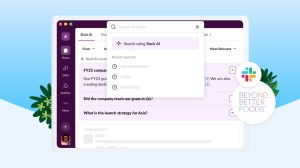The pandemic brought historic challenges to healthcare and life sciences organizations. But amid the challenges, there was also transformation.
In a year when so much was paused, technology innovation in healthcare has accelerated. Organizations of every size and type found new ways to digitally evolve their operations and expedite innovation from disease and vaccine management to telemedicine and clinical trials.
It has been inspiring to watch — teams in every health industry function have embraced this pivotal time by shifting to a data-driven mindset.
In my new book, Navigating the Code: How Revolutionary Technology Transforms the Patient-Physician Journey, I make the case for for the need for a new kind of transformative healthcare experience for patients and physicians, one where data and technology enables organizational transformation and is an impactful tool for solving business problems.
Data culture fuels transformation
When faced with a crisis, the importance of data literacy and embracing a data culture is critically important. Every decision, in addition to its heightened importance, also attracts additional scrutiny. Data fuels analytics. Analytics drives process change. Process change leads to transformational outcomes.
The disrupters will be people from outside healthcare who are tired of waiting for us to fix the inefficiencies, who cannot afford access to good care, who are tired of being denied access to their own clinical data.
David Shulkin, MD, Ninth U. S. Secretary of Veterans Affairs
Fundamental change is required to arrive at this place. Building upon well-known clinical Hippocratic ideals of quality, access, and outcomes healthcare organizations must take simple and straightforward steps to address modern digital transformation needs:
- Acknowledge and address the critical need for change
- Design and implement a change management strategy
- Put revolutionary healthcare information technology (RHIT) tools to work managing the change process
- Integrate RHIT tools with the Chaiken Methodology to achieve a patient-centered transformation in healthcares
What is often lacking is a systemic workflow to support and integrate these solutions to provide better outcomes: transformational outcomes. As the word itself implies, a transformational outcome is truly what we in healthcare strive for in everything we do.
As David Shulkin, MD, Ninth U. S. Secretary of Veterans Affairs says in the book, “If we continue to operate healthcare the way we have, and only improve through incrementalism, our system of healthcare will be transformed by organized groups of disrupters. These will be people from outside healthcare who are tired of waiting for us to fix the inefficiencies, who cannot afford access to good care, who are tired of being denied access to their own clinical data.”
The future of healthcare is data-driven
The rapid evolution of healthcare makes it clear that the future depends on improving access to data and technology to drive transformation.
New challenges and constraints on healthcare will emerge, but opportunities to innovate remain limitless. Leaning into this vision for transforming the industry and patient-physician journey is a powerful place to start.
Together, all of us — technologists and practitioners, researchers and clinicians, executives and front-line workers — can continue to build on what we’ve learned, harnessing technology, deepening our digital capabilities, and using data analytics to influence better care outcomes.
For more information about how Tableau is helping healthcare organizations become data-driven, visit the data mindset.



















